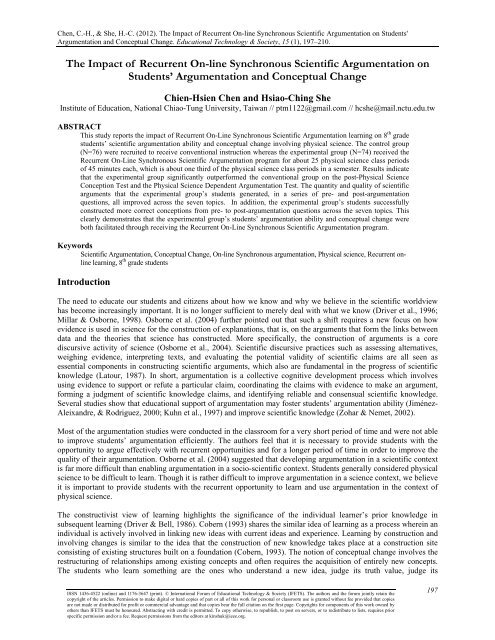January 2012 Volume 15 Number 1 - Educational Technology ...
January 2012 Volume 15 Number 1 - Educational Technology ...
January 2012 Volume 15 Number 1 - Educational Technology ...
Create successful ePaper yourself
Turn your PDF publications into a flip-book with our unique Google optimized e-Paper software.
Chen, C.-H., & She, H.-C. (<strong>2012</strong>). The Impact of Recurrent On-line Synchronous Scientific Argumentation on Students'<br />
Argumentation and Conceptual Change. <strong>Educational</strong> <strong>Technology</strong> & Society, <strong>15</strong> (1), 197–210.<br />
The Impact of Recurrent On-line Synchronous Scientific Argumentation on<br />
Students’ Argumentation and Conceptual Change<br />
Chien-Hsien Chen and Hsiao-Ching She<br />
Institute of Education, National Chiao-Tung University, Taiwan // ptm1122@gmail.com // hcshe@mail.nctu.edu.tw<br />
ABSTRACT<br />
This study reports the impact of Recurrent On-Line Synchronous Scientific Argumentation learning on 8 th grade<br />
students’ scientific argumentation ability and conceptual change involving physical science. The control group<br />
(N=76) were recruited to receive conventional instruction whereas the experimental group (N=74) received the<br />
Recurrent On-Line Synchronous Scientific Argumentation program for about 25 physical science class periods<br />
of 45 minutes each, which is about one third of the physical science class periods in a semester. Results indicate<br />
that the experimental group significantly outperformed the conventional group on the post-Physical Science<br />
Conception Test and the Physical Science Dependent Argumentation Test. The quantity and quality of scientific<br />
arguments that the experimental group’s students generated, in a series of pre- and post-argumentation<br />
questions, all improved across the seven topics. In addition, the experimental group’s students successfully<br />
constructed more correct conceptions from pre- to post-argumentation questions across the seven topics. This<br />
clearly demonstrates that the experimental group’s students’ argumentation ability and conceptual change were<br />
both facilitated through receiving the Recurrent On-Line Synchronous Scientific Argumentation program.<br />
Keywords<br />
Scientific Argumentation, Conceptual Change, On-line Synchronous argumentation, Physical science, Recurrent online<br />
learning, 8 th grade students<br />
Introduction<br />
The need to educate our students and citizens about how we know and why we believe in the scientific worldview<br />
has become increasingly important. It is no longer sufficient to merely deal with what we know (Driver et al., 1996;<br />
Millar & Osborne, 1998). Osborne et al. (2004) further pointed out that such a shift requires a new focus on how<br />
evidence is used in science for the construction of explanations, that is, on the arguments that form the links between<br />
data and the theories that science has constructed. More specifically, the construction of arguments is a core<br />
discursive activity of science (Osborne et al., 2004). Scientific discursive practices such as assessing alternatives,<br />
weighing evidence, interpreting texts, and evaluating the potential validity of scientific claims are all seen as<br />
essential components in constructing scientific arguments, which also are fundamental in the progress of scientific<br />
knowledge (Latour, 1987). In short, argumentation is a collective cognitive development process which involves<br />
using evidence to support or refute a particular claim, coordinating the claims with evidence to make an argument,<br />
forming a judgment of scientific knowledge claims, and identifying reliable and consensual scientific knowledge.<br />
Several studies show that educational support of argumentation may foster students’ argumentation ability (Jiménez-<br />
Aleixandre, & Rodriguez, 2000; Kuhn et al., 1997) and improve scientific knowledge (Zohar & Nemet, 2002).<br />
Most of the argumentation studies were conducted in the classroom for a very short period of time and were not able<br />
to improve students’ argumentation efficiently. The authors feel that it is necessary to provide students with the<br />
opportunity to argue effectively with recurrent opportunities and for a longer period of time in order to improve the<br />
quality of their argumentation. Osborne et al. (2004) suggested that developing argumentation in a scientific context<br />
is far more difficult than enabling argumentation in a socio-scientific context. Students generally considered physical<br />
science to be difficult to learn. Though it is rather difficult to improve argumentation in a science context, we believe<br />
it is important to provide students with the recurrent opportunity to learn and use argumentation in the context of<br />
physical science.<br />
The constructivist view of learning highlights the significance of the individual learner’s prior knowledge in<br />
subsequent learning (Driver & Bell, 1986). Cobern (1993) shares the similar idea of learning as a process wherein an<br />
individual is actively involved in linking new ideas with current ideas and experience. Learning by construction and<br />
involving changes is similar to the idea that the construction of new knowledge takes place at a construction site<br />
consisting of existing structures built on a foundation (Cobern, 1993). The notion of conceptual change involves the<br />
restructuring of relationships among existing concepts and often requires the acquisition of entirely new concepts.<br />
The students who learn something are the ones who understand a new idea, judge its truth value, judge its<br />
ISSN 1436-4522 (online) and 1176-3647 (print). © International Forum of <strong>Educational</strong> <strong>Technology</strong> & Society (IFETS). The authors and the forum jointly retain the<br />
copyright of the articles. Permission to make digital or hard copies of part or all of this work for personal or classroom use is granted without fee provided that copies<br />
are not made or distributed for profit or commercial advantage and that copies bear the full citation on the first page. Copyrights for components of this work owned by<br />
others than IFETS must be honoured. Abstracting with credit is permitted. To copy otherwise, to republish, to post on servers, or to redistribute to lists, requires prior<br />
specific permission and/or a fee. Request permissions from the editors at kinshuk@ieee.org.<br />
197

















